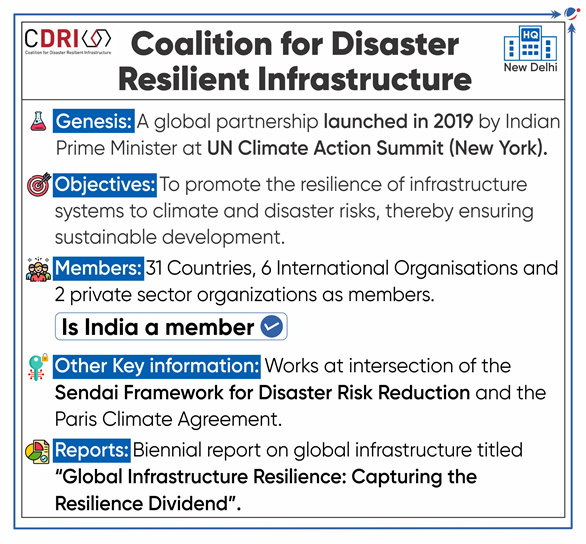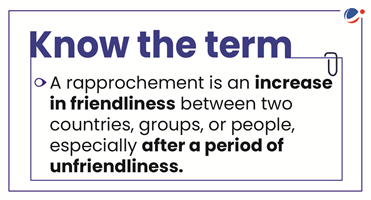Why in the news?
Recently, 6th edition of the International Conference on Disaster Resilient Infrastructure (ICDRI) held in India, which emphasized the nation's expanding contribution to global crisis response efforts.

About Disaster diplomacy
With increased disaster response capacities at home, India's disaster diplomacy began to take shape.
- Disaster diplomacy is a fairly new academic field that deals with the impact of disasters on international relations.
- Disaster Diplomacy refers to 'a country's efforts to provide aid and support to other countries affected by natural/ man-made disasters or conflicts'.
- This approach to diplomacy involves a country's deployment of personnel, resources, and aid to provide assistance to those in need.
- The Use of Foreign Military and Civil Defence Assets in Disaster Relief - "Oslo Guidelines" (adopted in 1994, updated in 2006) sets the guiding principles of humanitarian assistance for UN humanitarian agencies.
Significance of India's disaster diplomacy
- Soft Power Projection: By providing humanitarian assistance during crises, India aims to foster goodwill and strengthen ties with other nations.
- Increased geopolitical reach: By responding to crises stretching from Japan in the Far East to Turkey in the Middle East, New Delhi is underscoring the reality of its rise to major power status
- Breakthroughs in bilateral ties: India's Operation Maitri during the Nepal earthquake of 2015 played a crucial role in India's outreach to Kathmandu in the years afterward. Also, India has been steadily pushing a rapprochement with Turkiye.
- Strategic Importance of Humanitarian Assistance and Disaster Relief (HADR): India sees HADR as a key element of its foreign policy and statecraft, countering geopolitical influences, particularly from China.
- India's approach is typically non-intrusive and aimed solely at assisting affected nations without violating their sovereignty.

Factors contributing to India's global crisis response
- India's aspiration to become regional power and secure a UN Security Council membership drives increased development assistance during disasters.
- India's commitment to the Global South and Neighbourhood First Policy strengthens regional ties and capacity-building.
- Leveraging domestic disaster management capacities developed from past emergencies.
- India's robust economic growth enhances its global influence and resources for disaster diplomacy.
India' Approach towards disaster relief
| Approach | India's initiatives |
|---|---|
| First responder to natural disasters |
|
| Capacity Building |
|
| Helping people in Conflict Zones |
|
| Post-conflict relief and rehabilitation |
|
| UN Peacekeeping |
|
| Managing Health Disasters |
|
Key challenges faced by India in its Disaster diplomacy
- Lack of technological capacities: India's response to the 2011 Fukushima disaster in Japan was tardy and the National Disaster Response Force (NDRF) was unable to effectively provide aid.
- Limited Impact: India's assistance to Nepal has also not delivered lasting benefits as the bilateral relationship has become increasingly strained over territorial disputes since 2021.
- Geopolitical tensions: India's diplomatic efforts in disaster response can be hindered by existing geopolitical tensions with neighbouring countries, impacting collaboration and coordination during crises.
- Potential rejection due to historical hostilities: Pakistan rejected India's aid during 2022 floods.
Way Forward
India's disaster diplomacy is set to be an increasingly important part of the country's foreign policy toolkit. The increasing occurrence of climate change related disasters will place a greater demand on India's particular capabilities.
- Need for Capacity Building: India needs to enhance its HADR capabilities through investments in platforms like utility helicopters, landing platforms, and hospital ships, to ensure faster and more effective response to disasters.
- NDRF to increasingly incorporate technology in its relief duties and develop much better SOPs and much quicker response times.
- Improve budgetary allocation: Budgetary allocations to improve emergency preparedness and logistic capabilities.
- Projection of Achievements: India needs to improve its projection of humanitarian achievements amidst its ambition to become global power.
- Utilizing Forums like the Quad: Emerging forums like the Quad (Australia, Japan, India, and the USA) should be utilized for humanitarian assistance and disaster relief efforts.
- This cooperation can lead to capacity building across the Indo-Pacific and enhance India's image as a growing power capable of administering operations beyond its borders.








